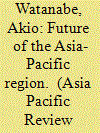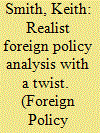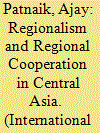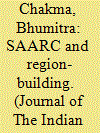|
|
|
Sort Order |
|
|
|
Items / Page
|
|
|
|
|
|
|
| Srl | Item |
| 1 |
ID:
128258


|
|
|
|
|
| Publication |
2013.
|
| Summary/Abstract |
This article discusses the origin and significance of the designation of the area surrounding Japan as the Asia-Pacific region. It then outlines the members of the region and the various organizations in which they participate. After describing the economic and cultural achievements to date, the article points out the issues challenging the Asia-Pacific region and encourages leaders in this "security complex" to remove obstacles to peace and security going forward in the twenty-first century.
|
|
|
|
|
|
|
|
|
|
|
|
|
|
|
|
| 2 |
ID:
146342


|
|
|
|
|
| Summary/Abstract |
Analyses of US post-Cold War foreign policy in the Persian Gulf symbolize realism's new found concern with foreign policy analysis. Prominent realists attribute specific policies to domestic concerns and how they have dominated policymaking in the era of US primacy. Although convincing, this perspective is not comprehensive. By drawing on regional security complex theory, it is possible to map the regional developments that have equally constrained and incentivized the rise and fall of dual containment. This more extensive account produces two important findings regarding realism's neglect of the regional level of analysis. First, realists overstate the domestic determinants of US policy in the Persian Gulf. Second, and more broadly, realist foreign policy analysts underspecify systemic pressures that shape and shove a country's foreign policy.
|
|
|
|
|
|
|
|
|
|
|
|
|
|
|
|
| 3 |
ID:
167050


|
|
|
|
|
| Summary/Abstract |
In the post-Soviet period, Central Asia has lost the cohesiveness it had in the Soviet period. The states of the region have since been seeking outward linkages to pursue their economic and security interests. In the process, the relation between the Central Asian countries weakened and, in some cases, became adversarial. The nation-building process undertaken by the national leaders alienated ethnic minorities and neighbouring states. As a result, the regional mechanisms or organizations that have come up in the region are led or initiated by powers such as Russia, China and the USA. The competing interests of these powers have not helped in promoting cooperation among the Central Asia countries though some of these organizations are useful for member states. However, a new trend is visible since 2016 when a new leader became president in Uzbekistan. Improved bilateral relations and summits of leaders of the region create hope for a new regionalism in Central Asia that is based on the internal cooperative dynamics within the region. This may not replace the already existing mechanisms or organizations. However, the process itself is conducive for intra-regional cooperation and would be helpful in keeping the region free from the geopolitical competition of external powers.
|
|
|
|
|
|
|
|
|
|
|
|
|
|
|
|
| 4 |
ID:
177205


|
|
|
|
|
| Summary/Abstract |
This introduction outlines how the fragmentation of the Middle East state system, coupled with the shifts in the centrality of oil to the well-being of the Global economy, has now recast debates about the very nature of energy security and the future stability of the Gulf monarchies. Acting as a primer to the articles that comprise this special section of Journal of Arabia Studies, it highlights many of the attendant security issues surrounding energy diversification strategies now being adopted by many of the regions actors, while also highlighting the key differences that have shaped the responses of the individual Gulf monarchies to the challenges they now face in an ever more uncertain era.
|
|
|
|
|
|
|
|
|
|
|
|
|
|
|
|
| 5 |
ID:
160249


|
|
|
|
|
| Summary/Abstract |
Region’ is a contested concept. Although scholars have extensively debated the issue, there is no consensus on the definition of region. While some scholars emphasize geographic proximity as a key factor, others put importance to cognitive and ideational factors, yet some others seek to combine the two perspectives to define region. Against such a background, this paper explains the complexities of defining South Asia as a region. It explores the historical evolution of the identification of the region and analyses how region building in recent decades, instead of consolidating its regionness, has produced a multiplicity of discourses, narratives and meanings about South Asia as a region. This is particularly evident if South Asia is examined in terms of ‘economic,’ ‘security’ and ‘cultural’ region. Importantly, these discourses, narratives and meanings are not necessarily symmetrical and compatible with each other although they co-exist in an uneasy manner at both regional and national levels. And, they are contingent and subject to change over time.
|
|
|
|
|
|
|
|
|
|
|
|
|
|
|
|
| 6 |
ID:
090726


|
|
|
|
|
| Publication |
2009.
|
| Summary/Abstract |
In Discipline and Punish Foucault famously declares that "our society is one not of spectacle, but of surveillance." Our theoretical aim in this paper is to problematize Foucault's strict demarcation between spectacle and surveillance through an analysis of urban mega-events. In the process, we detail emerging features of contemporary mega-events that shape and are shaped by shifts in the field of security and surveillance more broadly. Three dynamics in particular warrant consideration: the move toward a precautionary logic among security planners, a "semiotic shift" wherein security iconography is integrally bound up with the production of contemporary urban spectacles, and various forms of security and surveillance legacies that circulate beyond the spatial and temporal frame of the event itself. While mega-events support Foucault's assertion of the dispersal of discipline across the social field, they also suggest that this dispersal occurs in concert with, not in spite of, the power of the spectacle in contemporary society.
|
|
|
|
|
|
|
|
|
|
|
|
|
|
|
|
|
|
|
|
|